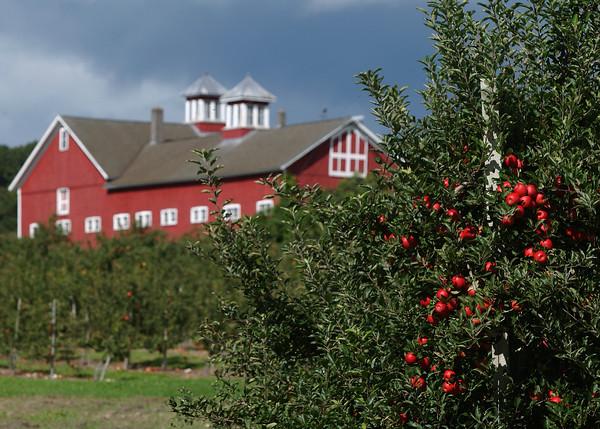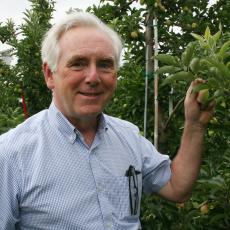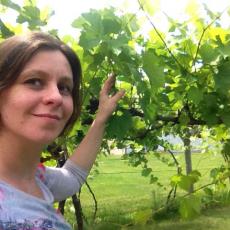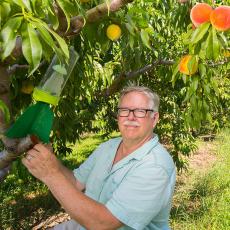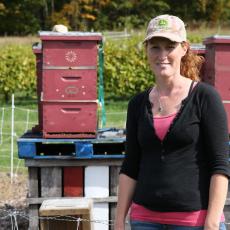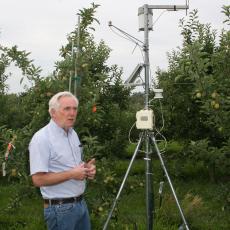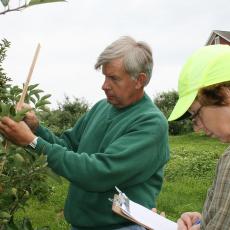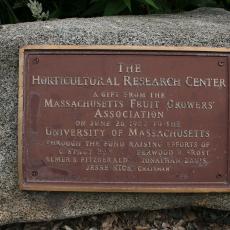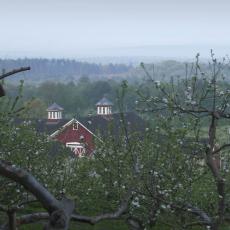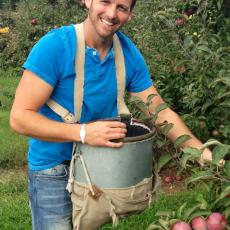In Our Spotlight
Cold Spring Orchard Research and Education Center in Belchertown, Mass.
Belchertown Massachusetts is the site of the enormous and well-known Quabbin Reservoir, built in the 1930’s to provide drinking water for metropolitan Boston. But there’s another impressive state resource in Belchertown that may get less attention but that you might appreciate with every local apple you chomp into this fall! If you scanned the view from a hilltop in Belchertown just one-and-a-half miles directly south of the southern tip of the reservoir, you would see acres and acres of apple trees (and peach, plum, pear and cherry trees… and grapes, blueberries and other small fruit) thriving on the hillside. On that hilltop, you would be gazing out at Cold Spring Orchard Research and Education Center (CSO), the primary site for fruit tree and small fruit research for the nearby University of Massachusetts Amherst.
In 1961, after the former UMass research orchards on the Amherst campus began sprouting dormitories, the Massachusetts Fruit Growers’ Association purchased and donated this lovely former dairy farm to the University. Since then the Association has maintained an active role in supporting and advising the Orchard’s faculty and staff.
Of the 250 acres that comprise CSO, 45 acres are devoted to apples and peaches. The remainder of research fruit grows on eight additional acres. About 25 or so varieties of apples are grown and sold at the Orchard’s retail stand, through wholesale markets and at pick-your-own seasonal sales (you can see a list of the varieties on CSO’s web page; they include several types of heritage apples including Golden Russet and the Roxbury Russet, an apple thought to be the first apple cultivar bred in the United States, named in the Roxbury neighborhood of Boston in the mid-17th century.
Cold Spring Orchard is the hands-on laboratory for all UMass Amherst courses related to tree and small fruit and also regularly hosts extension education programs. Students receive hands-on experience at the orchard, education that is supplemented by class presentations. Faculty, extension educators, technicians, farm-crew members, and numerous summer employees work together to make this farm the premier pomology facility in New England.
RESEARCH: Focusing On the Fruit
 Wesley Autio is the Director of the Stockbridge School of Agriculture at UMass Amherst but is also a preeminent pomological researcher. He and Jon Clements collaborate as part of the multi-state “NC-140 Regional Rootstock Research Project (nc140.org).” Through this project, apple, peach, and cherry rootstocks are evaluated. They monitor, collect and report data about tree survival, precocity, yield, and tree size. The NC-140 project was recently awarded the 2015 Excellence in Multistate Research Award from USDA’s Experiment Station Committee on Organization and Policy. The award recognizes the importance of this collaborative effort to improve sustainability of fruit tree production through changes in rootstock use.
Wesley Autio is the Director of the Stockbridge School of Agriculture at UMass Amherst but is also a preeminent pomological researcher. He and Jon Clements collaborate as part of the multi-state “NC-140 Regional Rootstock Research Project (nc140.org).” Through this project, apple, peach, and cherry rootstocks are evaluated. They monitor, collect and report data about tree survival, precocity, yield, and tree size. The NC-140 project was recently awarded the 2015 Excellence in Multistate Research Award from USDA’s Experiment Station Committee on Organization and Policy. The award recognizes the importance of this collaborative effort to improve sustainability of fruit tree production through changes in rootstock use.
Daniel Cooley, of the Stockbridge School of Agriculture, has been a plant pathologist at UMass Amherst since 1978. Along with other researchers, Cooley is looking at ways to better manage apple diseases with fewer pesticides. This year, Cooley and Clements are using online technology to be more precise in timing sprays to control apple diseases. The two are developing and evaluating apple pest forecast systems, with the goal of reducing pest risks and chemical use in orchards. These include weather monitoring instruments as part of NEWA, automated insect traps (Z-Traps), sprayer automation, and decision-support tools for pest management. The methods also may allow growers to more precisely time organically-approved chemicals to better control apple diseases. They are examining both organic and conventional fungicides approved in the unique Eco Apple marketing program, which they helped to develop and continue to support. For more information, click here.
Professor Cooley’s lab is also looking at arguably the world’s most problematic apple disease, apple scab, to better understand when it most threatens the crop so that growers can treat at those times and not waste treatments at other times. Finally, their research is studying resistance of bacteria that cause the disease fire blight, which destroyed and damaged apple trees valued at millions of dollars from Pennsylvania to Nova Scotia last year, with the goal of advising growers which treatments will be effective.
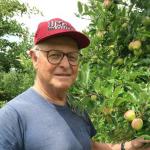 Duane Greene, professor, Stockbridge School of Agriculture, is based at the UMass Cold Spring Orchard. His focus is on several areas of pomology important to fruit growers. These include flower bud formation, fruit set, crop load management, growth control of trees and pre-harvest drop control. Since 1969, Greene has focused on horticultural techniques and plant hormones to develop sustainable strategies for fruit growers to a make fruit-growing profitable. Much of his effort is directed toward trying to understand the underlying physiological mechanisms involved in controlling fruit abscission (the natural detachment of the fruit from the tree).
Duane Greene, professor, Stockbridge School of Agriculture, is based at the UMass Cold Spring Orchard. His focus is on several areas of pomology important to fruit growers. These include flower bud formation, fruit set, crop load management, growth control of trees and pre-harvest drop control. Since 1969, Greene has focused on horticultural techniques and plant hormones to develop sustainable strategies for fruit growers to a make fruit-growing profitable. Much of his effort is directed toward trying to understand the underlying physiological mechanisms involved in controlling fruit abscission (the natural detachment of the fruit from the tree).
Crop load management, especially fruit thinning, is probably the most difficult activity a grower must undertake and it has a greater effect on grower income than almost any activity performed in the orchard. This is an area on which Greene has focused in recent years. He has helped to develop a computer model using weather to predict thinner response. This allows growers to decide when the best and most effective time is to apply a thinner and what thinner should be applied to have the best chance for success. Greene leads the thinner response predictor effort in cooperation with other pomologists in the Eastern U.S. to develop a computer model. Both of these models are now being used by growers to achieve the appropriate crop load in their orchard. Sometimes losses from drop can be up to 50%. He is actively researching solutions.
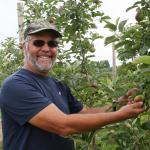 Jon Clements is an UMass Extension Educator. Thankfully, for those people who enjoy apples, peaches and cherries, fruit trees are his passion. For the past fifteen years, Jon Clements has been supporting the state’s orchardists not only with education and problem-solving, but also by conducting research focused on new tree fruit varieties, rootstocks, tree pruning and training, improving young tree growth, and new technology. Much of his research is conducted in an applied/demonstration fashion, and results are typically reported in UMass Fruit Notes, at fruit grower meetings or through individual consultations.
Jon Clements is an UMass Extension Educator. Thankfully, for those people who enjoy apples, peaches and cherries, fruit trees are his passion. For the past fifteen years, Jon Clements has been supporting the state’s orchardists not only with education and problem-solving, but also by conducting research focused on new tree fruit varieties, rootstocks, tree pruning and training, improving young tree growth, and new technology. Much of his research is conducted in an applied/demonstration fashion, and results are typically reported in UMass Fruit Notes, at fruit grower meetings or through individual consultations.
Clements is constantly evaluating apple, peach, and cherry varieties with an eye towards adaptability for New England growing environments and fruit quality. He collects data on flowering, yield, and fruit quality parameters that also note red skin color, flesh firmness, soluble solids (sugars), maturity, and storability.
Tree-pruning and training evaluations include perpendicular-V for peach, super-slender-axis for cherry, and super- and tall-spindle for apple. Clements checks fruit yield and quality during pruning sessions. He examines tree structure (mostly apple trees) with plant growth regulators and nutrient supplements. Measurements of tree growth and branching are conducted as part of the overall evaluation.
Clements also evaluates new hybrid trees for growers through a breeding program. Growers appreciate the controlled environment of Cold Spring Orchard. He receives several varieties of hybrid trees that growers hope will become marketable. Over the course of a few years, he will test apples for their size, color, sugar content and, of course, for their taste. A notable success, now widely available, is Honeycrisp, though most new varieties don’t make the cut.
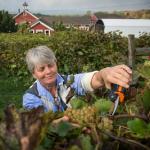 Sonia Schloemann, a UMass Extension Educator, specializes in small fruits. She is responsible for variety demonstration plantings of wine grapes (10 varieties), table grapes (12 varieties), blueberries (15 varieties), caneberry trellis innovation demonstration planting (2 trellis systems with 3 varieties of blackberry and 3 varieties of black raspberry), and facilitating research plantings for wine/table grapes and blueberries with CNS faculty members Elsa Petit and Lynn Adler. All plantings are also available for teaching and Extension outreach programs and activities. Additionally, she supports minor plantings of beach plum (through a grant collaboration with Cornell University) and Schisandra chinensis, a Chinese medicinal vine (by means of a contract collaboration with farmer Tso-Chen Chang).
Sonia Schloemann, a UMass Extension Educator, specializes in small fruits. She is responsible for variety demonstration plantings of wine grapes (10 varieties), table grapes (12 varieties), blueberries (15 varieties), caneberry trellis innovation demonstration planting (2 trellis systems with 3 varieties of blackberry and 3 varieties of black raspberry), and facilitating research plantings for wine/table grapes and blueberries with CNS faculty members Elsa Petit and Lynn Adler. All plantings are also available for teaching and Extension outreach programs and activities. Additionally, she supports minor plantings of beach plum (through a grant collaboration with Cornell University) and Schisandra chinensis, a Chinese medicinal vine (by means of a contract collaboration with farmer Tso-Chen Chang).
Elsa Petit, a faculty member in the Stockbridge School of Agriculture, is researching canopy density for cold-hardy wine grapes. She says, “Little is known about growing cold-climate grape varieties to optimize fruit juice quality and control disease. Shoot and fruit cluster thinning early in the season can have tremendous effect on fruit juice quality (sugar, acidity) and might allow controlling disease by sustainable cultural practices rather than the use of fungicides. We are experimenting with low to high level of shoot and cluster thinning done in the late spring on the variety Frontenac, a cold tolerant variety grown at the UMass orchard in Belchertown. During the fall of 2015, we will measure the impact of different thinning methods on juice quality and disease."
Arthur Tuttle is a Research Associate with UMass Extension and the Stockbridge School of Agriculture. His recent projects include working with a group of Mass. fruit and vegetable growers (including UMass Cold Spring Orchard) to solve key pest management problems and increase the adoption of Integrated Pest Management (IPM) strategies (the eIPM Project). He is also working with Sonia Schloemann to monitor and manage populations of two relatively new invasive pests (spotted-wing Drosophila and brown marmorated stink bug) on MA farms.
Shawn McIntire has been Farm Superintendent of this 250-acre orchard since 2012. Having worked on-site for 20 years, he is well-acquainted with thousands of trees. Like any experienced multi-tasker, McIntire manages a crew of up to 10 people, implements a spray schedule, oversees sales, runs a harvest and pruning crew, works with the University teaching and research staff to achieve their research goals and acts a liaison between the University and the Massachusetts Fruit Growers’ Board of Trustees.
Kristen Hanley, Orchard Administrator, is a Jane-of-all-trades. One day she can be found canning jams and jellies with fresh fruit she picks from the orchard and the next day she manages bee hives, collecting honey. A month later, you will find her ordering trees, harvesting apples and acting as liaison between the orchard and UMass main campus around issues of procurement. She also has a tech side, managing the website and Facebook page for Cold Spring Orchard. When she is not performing tasks in the orchard, she enjoys interacting with members of the Massachusetts Fruit Growers’ Association. She relays, “They have great influence on what happens within the orchard regarding the direction of the farm. Recently, they recommended the purchase of a fruit-harvesting machine to speed up apple picking: Pluk-O-Trac. This new equipment has made a huge difference by providing platforms for easier picking and pruning of orchard trees.”
